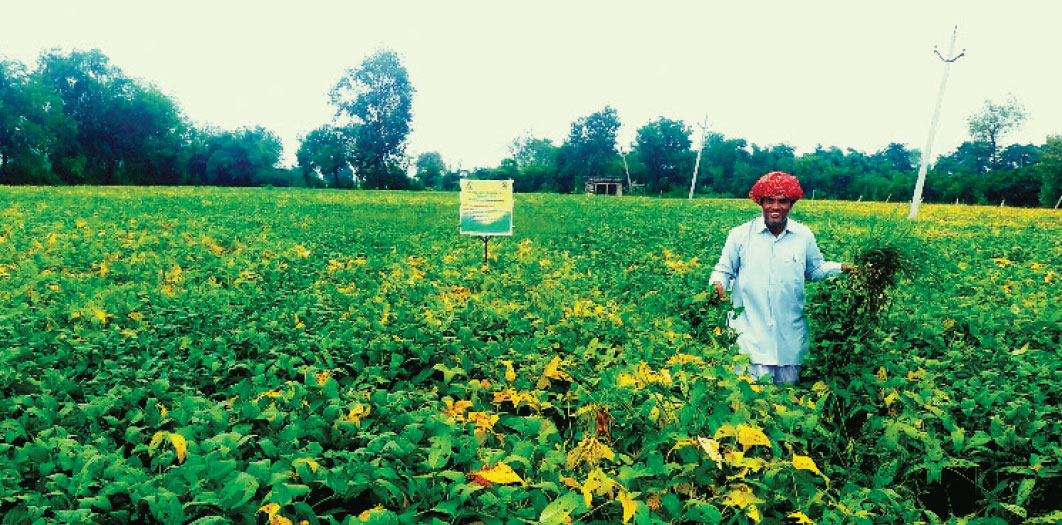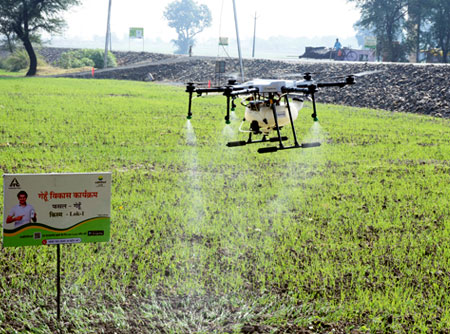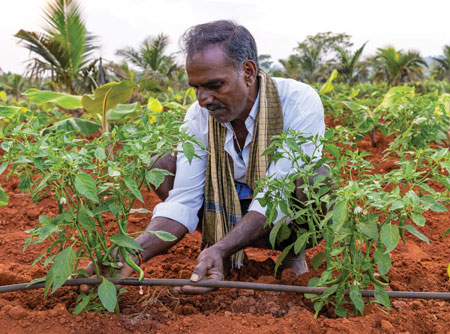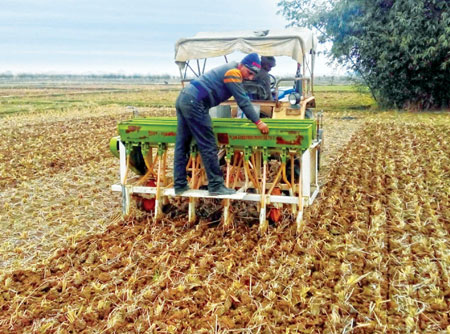
Ghanshyam Rathod is a small farmer in the Salari village of Rajasthan's Jhalawar district. For decades, he would eke out his living by cultivating two crops a year - soybean in the Kharif and wheat in the Rabi season. That is, till the rains began playing spoilsport. Heavy, untimely spells in his village started washing away crops, and Rathod, like many others, was unable to recover even their input cost.
It was then that ITC stepped in. In 2020-21, Rathod joined ITC's Climate Smart Village programme and applied his learnings from the training by adopting the Broad Bed Furrow method of sowing in soybean. The results were transformative. Not only did he learn how to counter the problem of excess flooding, he also managed to increase his yield of soybean crop from 3-4 quintals per bigha to 6 quintals per bigha. "My annual income increased by Rs.20,000 and I can now fight natural calamities. I am thankful to ITC for guiding me on how to counter the effects of climate change," says an elated Rathod.
Climate change poses a significant threat to farmers both in India and around the world. Each summer, farmers face extreme heatwaves and droughts that further deplete their already dry lands. In addition to these challenges, farmers have to deal with unpredictable rainfall patterns, water shortage, and soil erosion, which only add to their hardships.
The increasing frequency of extreme weather events reflects changes in the environment and has significant consequences for agriculture and food production. This is particularly concerning as the agri-food sector plays a crucial role in ensuring food security. It is predicted that food production will need to be increased by more than 50% by 2050 to accommodate the growing global population of 9.7 billion. India, projected to become the most populous country by 2023, may face a significant food security challenge. The Intergovernmental Panel on Climate Change (IPCC) cautions that a temperature rise of 1-4 degrees Celsius could lead to substantial reductions in rice (by 10-30%) and maize (by 25-70%) production in India.
However, solutions to address such climate risks are also available, as demonstrated by ITC.
As a company committed to its credo of 'Nation First, Sab Saath Badhein', ITC Limited, one of India's leading multi-business conglomerates, has made sustainable and inclusive development core pillars of its corporate strategy. Deeply engaged with India's agricultural community for decades, ITC has been working for development of the rural sector through intensive farmer empowerment programmes that range from disseminating knowledge of new age practices and technologies to implementing multi-dimensional programmes in sustainable farming to build climate resilience, improve water management, usher in digital revolution in Indian agriculture, enhance crop yield and augment farmer prosperity.
Amongst several programmes that ITC has implemented over the years, the following section highlights a few high impact interventions.

ITC has recently launched the Climate Smart Agriculture initiative, which has already benefitted over 7.4 lakh farmers, covering over 23 lakh acres in 17 states. A dedicated Climate Smart Village (CSV) programme, in partnership with the Climate Change and Food Security (CCAFS) programme of CGIAR, focuses on reducing vulnerability while increasing resilience of farmers towards climate change. CSV works towards making villages climate smart by promoting weather smart, water smart, seed/breed smart, carbon/nutrient smart and institutional/ market smart practices. In the first phase (2016-2018), the programme covered 15,000 farmers and seven key crops including soya, paddy, wheat, sugarcane, onion, mango, and gram in 600 villages spread across three states, while in the second phase of partnership (2019-21), ITC extended its CSV programme to 11 states where its Natural Resources Management programme was implemented. Currently, the CSV programme covers 4,800 villages and 10 lakh acres. The programme has demonstrated encouraging results with GHG emissions of soya and wheat reducing by upto 66%, net returns increasing by upto 90% as well as enhancement in yield by upto 38%. A study of 43 villages across three states that were part of the first phase, shows that 70% of the villages have moved into the High Resilience, High Yield category, thus becoming Climate Smart.

Building water security is another key element of ITC's climate smart agriculture programmes. With 54% of India being water stressed, there is need for smarter and newer ways of cultivation to attain higher yields with lesser water consumption. ITC's 360-degree water stewardship programme, aligned to Government of India's 'Jal Shakti Abhiyan' and 'More Crop Per Drop' mission, includes Demand Side Management initiatives that promote innovative crop and area specific agronomic practices like micro-irrigation, wider spacing and trash mulching to reduce water consumption, while simultaneously improving productivity and reducing cultivation costs. The practices adopted by farmers in 11.8 lakh acres created potential water savings of 780 million cu.m. leading to savings upto 45% across 15 crops.
ITC has over the years also implemented a large-scale community based integrated watershed development initiative covering catchment treatment, water harvesting structures development, and groundwater recharge spread over 14.7 lakh acres in 16 states with over 28,000 water harvesting structures built over time.

Focusing on reviving ecosystem services provided to agriculture such as natural regulation of pests, pollination, nutrient cycling, soil health retention and genetic diversity, ITC has implemented a biodiversity conservation initiative that has already covered nearly 3 lakh acres across 12 states.
Inspired by the Sustainability 2.0 vision articulated by Chairman Mr Sanjiv Puri ITC is now scaling up its interventions in Climate Smart Agriculture, water stewardship, and biodiversity conservation, among others. The aim is to extend its CSV programme to over 3 million acres, biodiversity conservation to over 1 million acres and improve crop water use efficiency in agri-value chains to enable annual savings of 2,000 million kilolitres of water by 2030. Such interventions would undoubtedly help usher in a new future for agriculture and rural communities and serve the nation's priorities as well.